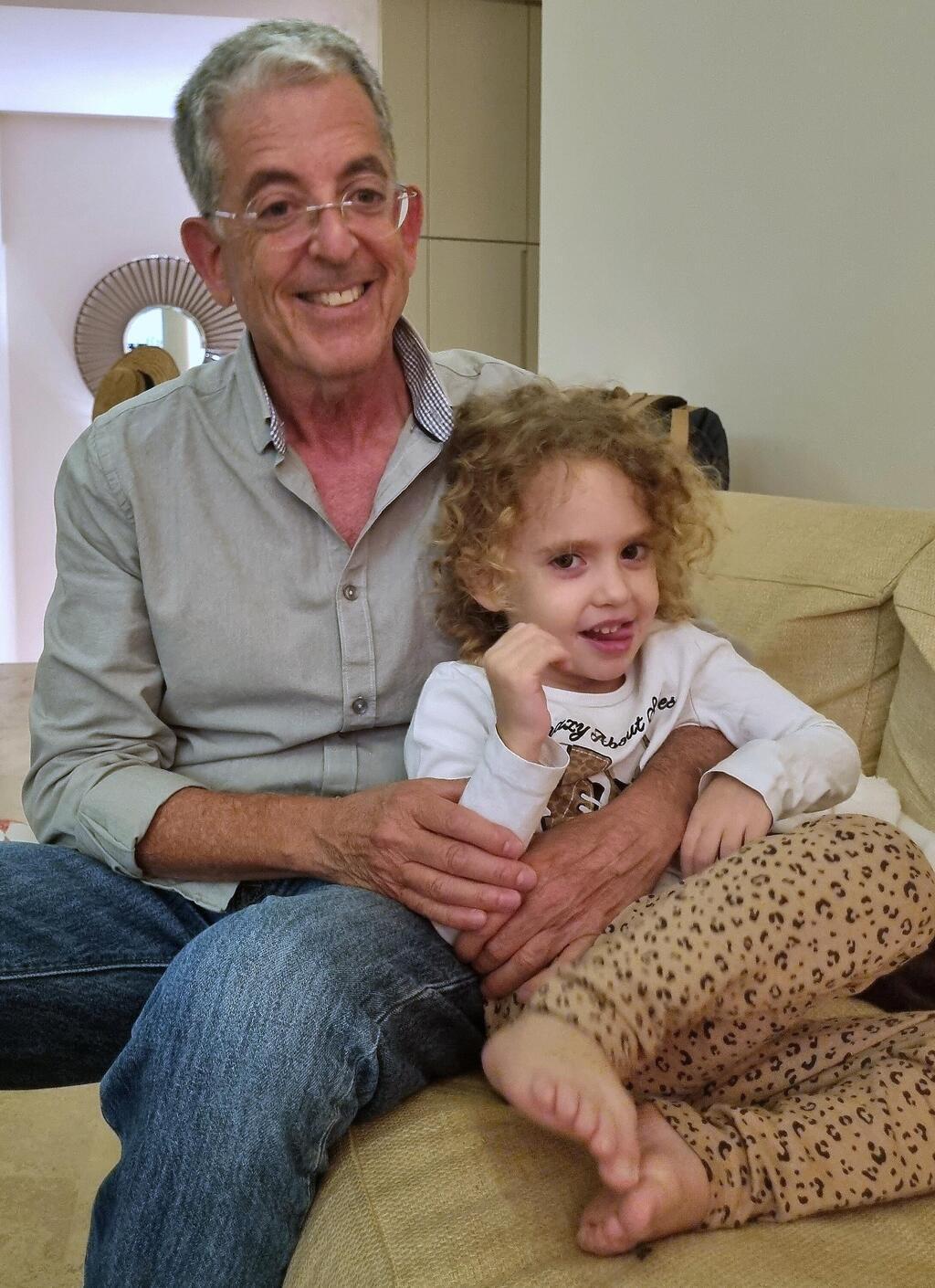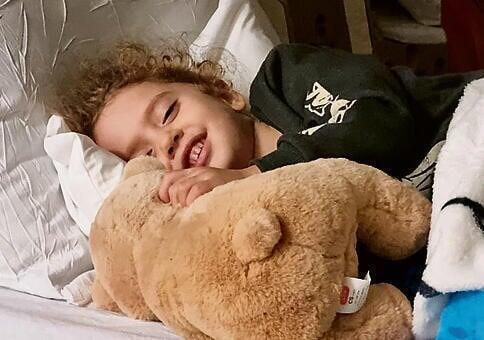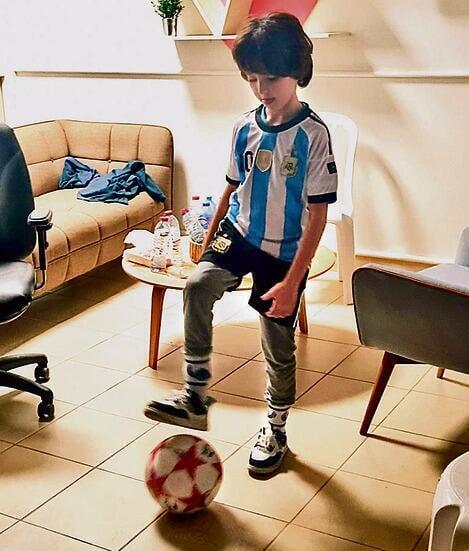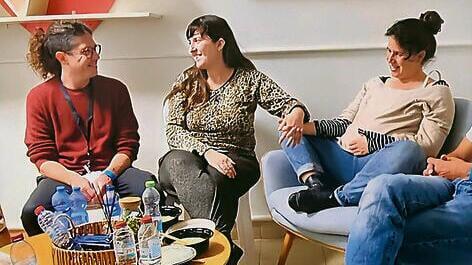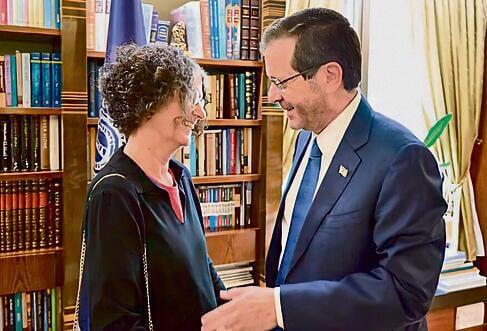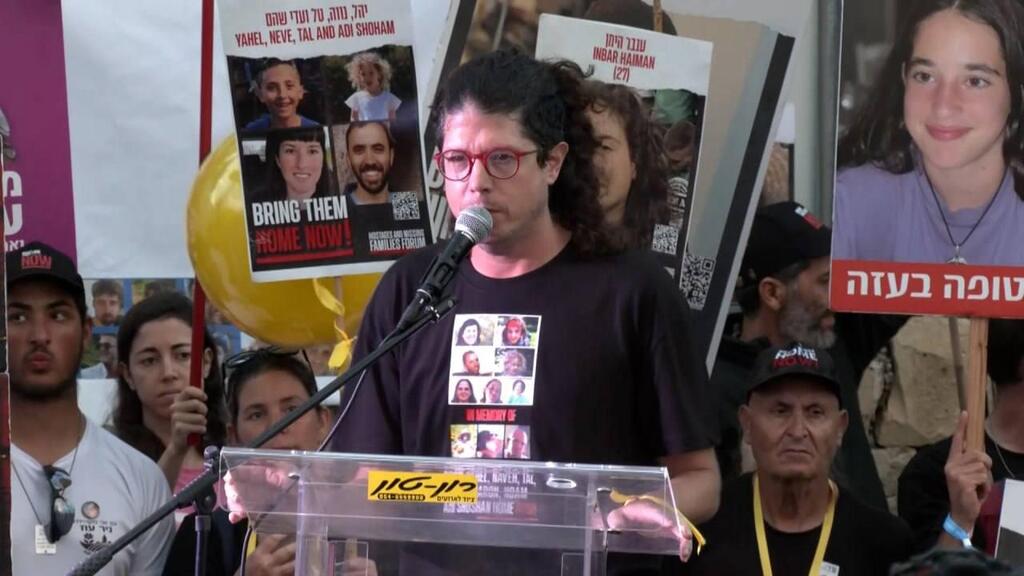My big sister, Shoshan Haran, returned from captivity in the early hours of November 26. What’s the possible connection between a 67-year-old woman and captivity? The answer is simple: Ever since October 7, time and reason have been disconnected from reality. Shoshan returned with her daughter, Adi, Adi’s children, Naveh and Yahel, her her sister-in-law Sharon Avigdor – her late husband, Avshalom’s sister – along with her daughter, Noam.
Read more:
Since their release, we’ve been asked dozens of times how they’re feeling. We have a standard family response: 6 out of 140 because in addition to Adi’s husband, many more Israelis are still held hostage and nothing will end until they’re all back.
Friday 10:18 pm. “Have you heard yet?” asks the IDF liaison officer, her voice charged with adrenalin. How could I have heard? She’s the one supposed to be telling me. “Your family’s on tomorrow’s list of people to be released. Shoshan, Adi, Naveh, Yahel, Sharon and Noam”.
I should be shouting for joy at this point. “Not Tal?” I should have known. He’s a man and men aren’t being released in the first batches. Anyway, we ended the conversation with “Good, great, wonderful” and agreed to be in touch on the morrow.
Five seconds later, messages start flooding in from all media outlets ... “You’re on tomorrow’s list”. If the liaison officer had called a moment later, or had accidentally misdialed, I’d have been informed by the media. But who’s complaining at a time like this? We tried keeping a low profile. This is Hamas. You never know what trick they might pull out of hat of horrors. They could give Israel one list and release different hostages. It didn’t do us much good. The names were all over WhatsApp.
Saturday, 4:57 pm. We receive a text message from the liaison officer reading “Be at Sheba Hospital between 5:30 and 6 pm.” Why so early? “Traffic’s terrible. We don’t want you to be held up.” We were at the hospital by 5:55 pm with no hint of traffic hold-ups en route. We made our way to the management parking lot – reserved for the new celebrities, the hostage families.
7 View gallery
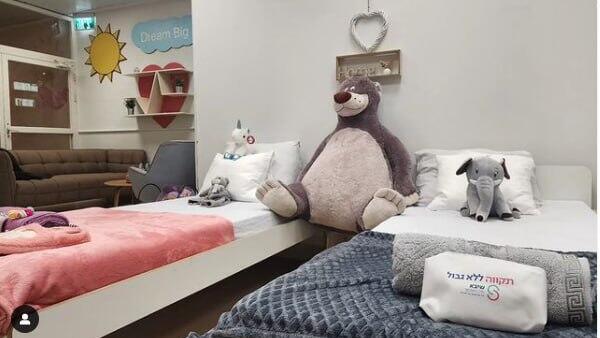

A room prepared for released hostages at the Sheba Medical Center
(Photo: Sheba Medical Center)
Donning ID tags and blue wristbands, we passed through a thick curtain guarded by soldiers, separating us from regular folk. Beyond this curtain was a complex prepared for the released hostages. Each family had their own room. Next to each bed was a brand-new duffle bag with basic equipment including a backpack and a new mobile phone fresh in its packaging. Whatever you need. Your wish is our command.
There was a spread of food including sandwiches, cookies and rugelach for the families awaiting their loved ones’ arrival. The enormous tension, this love bomb, the embrace from the state that kicked in on October 8 - one day too late - lead to an astronomic spike in the intake of carbohydrates. We’re now completely engrossed in a cause. We’re a bit miserable. This is no time for eating our greens and doing our sit-ups.
It's now 6 pm and there’s no sign of a release. We hear reports of glitches with Hamas. They’re claiming that Israel hasn’t released the Palestinian prisoners. The heap of rugelach is getting smaller. Eight o’clock comes and goes, and still no sign of a release. Hamas is now claiming that Israel isn’t allowing humanitarian aid trucks through. Security sources are encouraging us to remain optimistic, but another sandwich flies off the buffet.
8:44 pm. A source in the know texts us. “It’s going to happen. Just hold on there. Don’t tell anyone.“ I didn’t tell anyone. It’s now 9 o’clock and there’s still no sign… security sources keep asking us to…
At 10 o’clock, we realize the problems won’t be solved anytime soon. The liaison officer (“Be at Sheba Hospital between 5:30 and 6 pm”) suggests that the families get some rest. We can use the hotel in the adjacent Maccabiah Village or the one closer to Sheba Hospital. They’re paying for the rooms, and for transportation. Sure. Celebrities. A vehicle arrives to collect me and my brother, Dudi. Before we had the chance to fasten our seatbelts, we’re at the hotel. A room each. And why not?
I turn on the TV and, with one eye shut and the other on the screen, try to doze off. At almost 11:30 pm, the Red Cross cars finally pull up. The cameras try to find the faces inside. There’s Sharon, and our Noam. We see them clearly. There’s another vehicle behind. The face of a teenage boy. And another face. But where’s the rest of our family? Did Hamas carry out their evil plan to trick us?
"11:45 pm. Zohar, a good friend with good eyesight, texts me. “It’s crazy. Did you recognize them all?" "Yessssssssss.” I respond. “I didn’t see Shoshan, Adi, Naveh or Yahel. Did you?” 11:46 pm, Zohar. “I saw Shoshan. She was first off the bus”. 11:47 pm Zohar. “We’ve now been informed that they’re all here"
Now we see a bus. Various people get off. The only one I recognize is sweet little Emily Hand, who had been presumed murdered.
11:45 pm. Zohar, a good friend with good eyesight, texts me. “It’s crazy. Did you recognize them all?" "Yessssssssss.” I respond. “I didn’t see Shoshan, Adi, Naveh or Yahel. Did you?” 11:46 pm, Zohar. “I saw Shoshan. She was first off the bus”. 11:47 pm Zohar. “We’ve now been informed that they’re all here. “
It's almost midnight and I’m alone in a hotel room. The closest thing to Champagne is a little bottle of mineral water. My arms are up the air, shouting and choking a little. ‘Yesssssss’. I shed a tear. No one could see me anyway.
Although it’s another two hours before they’re expected at Sheba Hospital, we thank the hotel, bid our farewells and return to the complex prepared for the released hostages. By now, the families are tired but the IDF personnel are more wide awake. Junior and senior officers, male and female, are wandering the corridors. Some even seem to be doing something.
Meanwhile, Yuval, Shoshan's son who was a combat soldier, tweaks the rooms awaiting our family. In the room for Adi and the children, the light’s too bright. It has to be dimmed. They bring in an electrician to fix it. The wall in Shoshan’s room is bare. We need a picture for a bit of warmth. A maintenance guy is brought in to drill in a screw and someone rushes to a storeroom to find a picture. Not exactly Shoshan’s taste, but she moved into the room with Adi and the children anyway. Someone else would appreciate the artwork.
2:19 am. My wife, Gila; “When are they getting here?” 2:20 am, me. “I don’t know. Soon.” I check my watch about an hour later. They’re here.
The longest hug was with Shoshan. Our longest hug ever. Our late parents, the stern German-born man and the librarian, must be turning in their graves. I don’t remember the first thing I said. I really don’t. It wasn’t, as planned, “Good of you to come”. Maybe it was something about the ridiculous dress she was wearing, with the embroidery – courtesy of Gaza haut couture.
Then a mega-hug with Adi, and a kiss on the forehead. “Watch out,” she said. “I have lice”. Next came Naveh, who I lifted up. “Be careful” he said. “Don’t squeeze me too tight”. Then Yahel.
Yahel is a different story. You don't just hug Yahel. I had to gradually regain her trust. I needed to try and make eye contact and get a smile out of her. That same smile that had been sprawled over posters and the front page of newspapers, for weeks. Before that terrible shabbat her parents, mindful of their privacy, wouldn’t even allow their daughter’s pictures on social media.
When Yahel’s smile shone through, I just couldn’t hold back the emotions anymore. Now, attached to the teddy bear she was given at the border crossing, she’s playing with Uncle Mor. He’s reading her a story. They’re lying on the bed pretending to be asleep. It’s late, almost morning, but who can fall asleep on a night like this? She lies there smiling, hugging the teddy bear, pretending to sleep. Should I or shouldn’t I take out my camera at such a private moment? Click.
And how can anyone fall asleep while Naveh’s playing soccer? His ball, which was found next to Shoshan and Avshel’s destroyed house, was waiting for him on his bed. There were also four football jerseys from the world’s top teams, on his bed. He just had to choose. He went for Argentina. In less than a minute, he’s shooting between goalposts made of chairs.
He hasn’t lost his touch. Click. He’ll soon be doing a European tour. Atletico Madrid, Barcelona and Bayern Munich have all offered to host him. Israel’s national squad too. They exhibited his left football boot that was found among the ruins to their latest European game when they spoke of the hostages taken.
When he gets back to his home in Ma'ale Tzviya, I’m sure he’ll hang David Polonsky’s wonderful illustration of an innocent boy emerging out of a football into an imaginary world. That was the picture that accompanied a story written by Shoham Smith in the literary supplement of Yediot Ahrnonot, illustrating a kidnapped un-named eight-year-old boy who became a little star.
But now, what’s going through his head as he’s kicking the ball around? What kind of emotional scars are etched inside him in those very long 50 days in captivity? Who knows? Will anyone ever know? “When we came to Gaza,” is how he describes the brutal kidnapping. Then he volunteers, “We ate a lot of fava beans. Sometimes it tasted good. Sometimes it didn’t.”
On the sofa next to him sit Shaked and Yuval with Adi in between them – in a leopard print shirt he’d never wear in normal times. Her hand is inside Shaked’s. She gazes at Yuval. They smile. Yuval is smiling! The two siblings who fought tooth and nail for their big sister’s return, are now with her.
Shaked is nine months pregnant. She had traveled to the United States on yet another diplomatic mission, to get the hostages back. Yuval, who before October 6th would run the other way at the sight of cameras and microphones, since October 8th has grown into the role of his life in the cause, leading the march of thousands to Jerusalem, calling for the government to do everything to release the hostages. So now, they’re peeling back the first layers of what they’ve been through, what she’s been through. One more click.
Adi talks about the whispering. At their captors’ orders, they only spoke in whispers while they were there. Yahel was the first to understand the new situation. The survival instincts of a three-year-old. She spoke quietly, cried quietly, laughed quietly. Naveh had to be hushed every now and then. Even now, in the warm and safe Sheba Hospital, they’re both still whispering.
And Shoshan, oh Shoshan. "Super-hero" wouldn’t cover it. The TV screen reads: “On today’s list of freed hostages are four women, eight children and a grandmother.” My sister’s down as a grandmother. She thought it was funny.
From the very first day in captivity in Gaza, it was clear that she was in charge. And here, with us all reunited, I look at her and see our mother. Stubborn and unbreakable. “My job was to make sure the whole family got home,” she says. “Every day, I believed it would happen.“
She speaks frugally about what happened “there.” It’s still too early for detail. How they were taken from the safe room, or the moment she lost contact with her husband, Avshalom, who was later murdered. But there are some things we can say: Adi snatched her children back from the hands of the kidnappers. And at one point during their captivity, a door suddenly opened revealing a further space holding a stockpile of weapons. The children were scared. Shoshan calmed them down. “Of course, they’ve got weapons. They’re guarding us.”
Ahead of their release, when all the hostages chosen to be freed, were assembled in one place, the Hamas terrorists made their videos. They planted their standard propaganda messages and turned on the cameras. Emily Hand spoke quietly and didn’t recite what they told her. The Hamas guy wanted to film her again. “No,” said Shoshan. “You’re not doing this to a nine-year-old girl.” They packed up. “You’re Shabab (a hoodlum)” they said to her. “I’m Shabab? I’m old,” she answered. “No, no, you’re Shabab.”
Two days after their release, Shoshan met the President of the State of Israel. Now, she looked more like Dr. Shoshan Haran, founder of “Fair Planet” that cares for food security of hundreds of thousands of people in Africa, rather than a captive of terrorists.
The embroidered dress had now been replaced with jeans and a black shirt and with all due respect to Issac Herzog, we’re not sure who was in charge there. “Now I’m back, you need to ensure that all the others come back too," she tells him.
Yuval standing next to her nodded. “You don’t know what having my mother a phone call away means to me,” he said to me. Now she’s here, Yuval is back fighting for the return of the rest of the hostages. Shaked too. Hopefully, they’ll be back by the time for Shaked to give birth.



